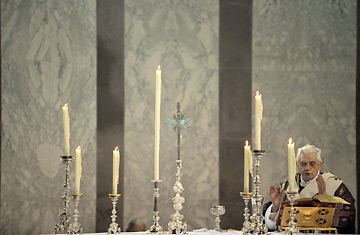
Pope Benedict celebrates Mass at the Basilica of St. Sabina, marking the start of the Lenten season, which leads to Good Friday.
Bringing back an ancient rite risked reopening ancient wounds. And so after Pope Benedict XVI introduced wider use of the old Latin rite last year, top Vatican officials promised to adjust a Good Friday prayer from the ancient liturgy that had called for the conversion of the Jews. The text of the updated version — released this week in the Vatican newspaper L'Osservatore Romano — deletes offensive language referring to Jews' "blindness" and the need to "remove the veil from their hearts." But the substance is left in place: "Let us pray for the Jews," the prayer says, according to an unofficial translation from Latin. "May the Lord our God illuminate their hearts so that they may recognize Jesus Christ savior of all men."
The wounds, according to top Jewish leaders and rabbis, have been reopened. They say the prayer, which in reality had never been scrapped completely, recalls past centuries of forced conversions and a lingering incomprehension of their faith. And while several well-known Jewish voices in New York and Jerusalem spoke of their "disappointment," the loudest — and indeed angriest — response to the revised text came from those closest to home. Late Wednesday, having had 24 hours to absorb the news and study the text, the Italian Rabbinical Assembly announced they were suspending the decades-long Jewish-Catholic dialogue for a "pause of reflection" in light of the Good Friday prayer.
Rome's chief Rabbi Riccardo Di Segni told reporters that the prayer brings Catholic-Jewish relations "back 43 years," noting that the 1960s Second Vatican Council had spoken of an "alliance" between the two faiths. Di Segni spoke indignantly about reassurances he said he'd received from Church leaders that his concerns about the conversion language would have been addressed. It raises questions about just what is the "image of the Jewish people for the Church," said Di Segni. "It's an old question: What are the Jews doing here on earth? If this [prayer] is the requirement for dialogue, it is intolerable. Evidently, the Church is having problems rediscovering the foundations of its orthodoxy."
Cardinal Walter Kasper, the Vatican's pointbman on Catholic-Jewish relations, responded to the criticism in a Thursday morning interview on Vatican radio. He said great progress has been made in interfaith dialogue with Jews, but it requires that "we respect each other's diversity." "We have much in common, but there's a specific difference. Jesus is the Christ, that means the Messiah, the son of God, and you cannot hide this difference. The Holy Father wanted to say: Yes, Jesus Christ is the Savior of all men, including the Jews. This is said in the prayer," Kasper said. "But this does not mean we have the intention of evangelizing [Jews]. We must give witness to our faith. But in the past the language was with disrespect. Now there is respect."
Huge steps forward have in fact been made since the days that Catholics blamed Jews for Jesus' death, and when the original Good Friday conversion prayer spoke of the "perfidious Jews." Pope John XXIII and Pope Paul VI began to rewrite Catholic teachings, paving the way for John Paul II's historic outreach to Jews, including visits to the central synagogue in Rome and the Wailing Wall in Jerusalem, and his characterization of the People of Israel as "older brothers" to Christians.
Reached in his office in Jerusalem, Rabbi David Rosen of the American Jewish Committee, a veteran of Catholic-Jewish dialogue, said that he too had his "hopes raised" that an explicit reference to conversion would have been excised. Rosen noted that the expansion of the Latin rite "had nothing to do with this prayer, and nothing to do with the Jews," but was rather an attempt by the Pope to mend fences with Catholic arch-traditionalists. Still, the language of the Good Friday prayer sounds to Jews to be "exclusivist and triumphalist," said the rabbi.
Rosen, who has worked with Benedict since he was a Vatican cardinal, said he worries that the Pope seems to "insulate" himself from top advisers who might alert him to potential fallout. Still, Rosen called his Italian rabbinical colleagues' break in dialogue with Catholics a "rash" decision. "There's so much at stake for Jews and Catholics and Benedict himself that we must ensure that this difficulty will not torpedo the commitment to advancing Jewish-Catholic relations," Rosen said. "Yes, we must speak up. But there is nothing to be gained from making this a casus belli." With reporting by Francesco Peloso/Rome
